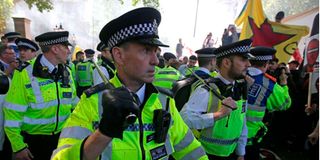Police accused in strip searches of children, most of them black

British Metropolitan Police officers outside the entrance to Downing Street in central London on May 15, 2018. The Metropolitan Police have been accused of misbehaviour in several policy areas recently.
What you need to know:
- A report claims that between 2018 and 2020, the Met carried out 650 intimate examinations, that is, strip searches, on children, some as young as 10.
- The report by Children’s Commission Dame Rachel de Souza stated that 58 per cent of the children were black, mostly boys.
- A spokesman for the Metropolitan Police said it had made changes to its search policies.
It’s hard to think of a time when life here has been so gloomy. The cost of living is soaring and huge increases in everybody’s gas and electricity bills are on the way come October.
The battle between Liz Truss and Rishi Sunak for the job of prime minister seems to be going on forever (actually, the winner will be announced on September 5).
Even the forecast of warm weather brings no joy since it is seen as heralding drought in an already bone-dry nation.
The Commonwealth Games in Birmingham were a welcome diversion for the sports-minded, with Australia topping the table on 178 medals, against 176 for England, 51 for Scotland, 28 for Wales and 18 for Northern Ireland.
Some 72 Commonwealth nations and territories took part, including Kenya, which placed 13th with 21 medals, Uganda 16th with five and Tanzania 32nd with three.
Abuse of women
When the cheers died down, however, the nation was confronted with yet another scandal involving our police, already facing charges of racism, violence and abuse of women, including inappropriate, sometimes sickening, use of social media by detective officers.
The latest scandal again involved the Metropolitan Police who operate in London and who have been accused of misbehaviour in several policy areas recently.
Now a report claims that between 2018 and 2020, the Met carried out 650 intimate examinations, that is, strip searches, on children, some as young as 10.
The report by Children’s Commission Dame Rachel de Souza stated that 58 per cent of the children were black, mostly boys, and 23 per cent of searches took place without an appropriate adult present, as required. More than half the children were freed without further action.
Irnya Pona of the Children’s Society, said, “Strip searches are intrusive and traumatic and children are being completely failed if even basic safeguards are not in place.
We are horrified by the number of children subjected to these searches.”
A spokesman for the Metropolitan Police said it had made changes to its search policies, adding, “We continue to work hard to balance the policing needs for this type of search with the considerable impact it can have on young people.”
The object of the search is usually for drugs.
* * *
Last week, this column carried a suggestion that the recently deceased Kenyan journalist, Joe Kadhi, could be memorialised by one of the universities where he worked by naming a hall or a wing in his honour.
As we wait for a response, reader Sammy Ade has another idea – that Nation reprint some of his famous columns from the past titled, “Joe Kadhi Asks Why.”
Sammy says: “As a school kid, I particularly remember one where he asked Kanu to forgive opposition leader Oginga Odinga, restore his freedoms and allow him to participate in elections. He had done all to show remorse.”
Our reader now notes the irony that “forty years later, Raila, a scion of Jaramogi, sought to be President in a coalition including Kanu”.
* * *
Covid deaths are dropping, emergency injection centres are disappearing from our streets, social distancing is mostly a thing of the past, and hardly anybody wears masks any more.
But if the pandemic has lost its day-to-day virulence, its negative effects linger, one of them being a large, predicted rise in alcohol-related deaths.
Two in-depth investigations discovered that heavy drinkers working at home, plus those who lived in deprived areas, drank more heavily during lockdown periods.
The research suggested that at best, heavy drinking habits could cause 1,830 extra deaths within two decades; at worst, there could be 25,000 deaths as well as a high toll of alcohol-related disease and a million extra hospital admissions.
Colin Angus, who led one of the studies, said, “The pandemic’s impact on our drinking behaviour is likely to cast a long shadow on our health. It paints a worrying picture at a time when the National Health Service is already under huge pressure due to treatment backlogs.”
* * *
Rueful reflections:
I don’t understand how the owners of a cemetery can raise burial prices and then blame the cost of living.
I had the right to remain silent but being Irish, I did not have the ability.
I always find it confusing when the teacher says, “Don’t get smart with me.”
And some thoughts about English grammar:
What’s the difference between a cat and a comma? One has claws at the end of its paws, and the other is a pause at the end of a clause.
A police officer knocked on my door and complained that my dog was chasing a boy on a bike. “That’s impossible, officer,” I said. “My dog doesn’t even own a bike.”
When I was young, there were only 25 letters in the alphabet. Nobody knew why.
Is there a word in English that uses all the vowels, including “y”? Unquestionably!





